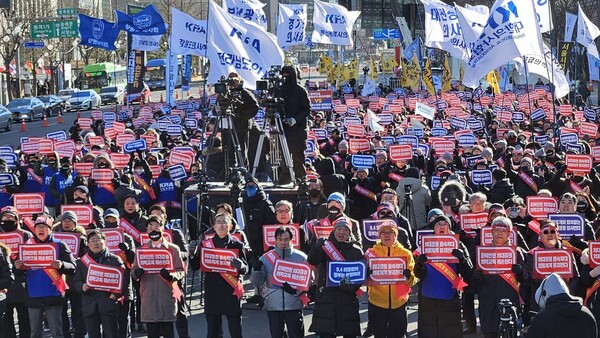In a controversial move, the Korean government announced a plan to increase the admission quota for medical schools by 2,000 students on Feb. 6, sparking fierce opposition from the medical community, including the Korean Medical Association (KMA) and other healthcare organizations.
The medical community contends that the current number of doctors in Korea is sufficient and argues that the government's initiative to expand medical school admissions as a solution to prevent the collapse of essential regional healthcare is misguided and ineffective.
Doctors warn that an increase in the number of doctors could lead to a surge in medical demand, exacerbating the financial strain on the national health insurance system.

Doctors say there are already 'too many' of them
A majority of physicians argue that the nation's current doctor population suffices. A survey by the KMA last November revealed that out of 4,010 respondents, a staggering 81.7 percent opposed the government's expansion plan. Among the dissenters, 46.3 percent believed that the current number of doctors is already high enough. Other concerns include a projected decrease in doctor demand due to a shrinking population, a potential rise in medical costs, and a feared dip in the quality of healthcare.
The KMA has expressed concerns that an influx of medical professionals might spike healthcare demand, thus destabilizing the financial integrity of the national health insurance and other medical fiscal frameworks. This apprehension is backed by a 2007 National Health Insurance Service study, which demonstrated a 22 percent increase in healthcare expenditures with each additional doctor per 1,000 people.
'Overcrowding in tertiary hospitals needs to be fixed first'
Critics also argue that the government's justification for medical school admission increases—aimed at bolstering essential and regional healthcare—is inherently flawed. Data suggests that while tertiary hospitals have seen revenue boosts from high-cost diagnostic procedures under the health coverage enhancement policies of the previous Moon Jae-in administration, local clinics have not benefited similarly. This made patients want to visit so-called "Big Five" hospitals and shun neighborhood primary care clinics.
The medical community is alarmed by the intensified patient concentration in tertiary hospitals, a situation aggravated by competition among university hospitals to establish metropolitan branches, potentially leading to a collapse of regional healthcare. From 2008 to 2018, the share of medical fees for tertiary hospitals surged by 13 percent, whereas clinics saw a nearly 20 percent decline.
Physicians advocate for a reformed medical delivery system that would enable tertiary hospitals to concentrate on severe cases only, thereby alleviating the pressure on lower-level clinics. Moreover, they highlight the lack of incentives for young doctors, who, after completing their internships and residencies, face low fees and daunting legal responsibilities in essential healthcare fields.
'Who will train those increased trainee doctors?'
Doctors also say that the government's plan raises concerns about the capacity of educational infrastructure to accommodate such a surge.
Woo Bong-sik, director of the KMA's Medical Policy Research Institute, emphasized the importance of clinical education and practice, stating that a rapid increase in student numbers would strain resources, echoing difficulties faced during the 1980s quota system era when a shortage of cadavers for anatomy classes was a significant issue.
As a result, Korean physicians are urging the government to address the underlying challenges in the healthcare system before proceeding with the expansion of medical school admissions. They argue for the normalization of judicial risks and operational difficulties to OECD standards, suggesting that addressing these core issues could prevent medical overconsumption and ensure the sustainability of both health insurance and healthcare services in Korea.
Related articles
- Trainee doctors threaten to quit in protest to sharp increase in med school students
- Korea's major medical school expansion plan faces backlash from medical community
- Trainee doctors at ‘Big 5’ hospitals to resign en masse on Monday
- Government pressures medical schools to disclose student information amid collective leave of absence protest
- Politicians call for ‘dialogue’ to resolve medical residents’ mass resignation
- Quota war between doctors, government intensifies, leaving patients helpless

